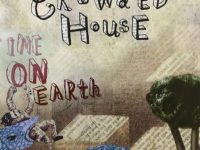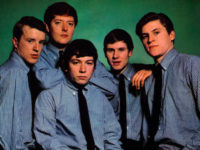Crowded House, beginning with their engaging breakthrough 1987 hit “Don’t Dream It’s Over,” were shot through with a complexity, and a melancholy, that belied their own supposed goals of becoming pop stars. Yet, in the wake of the 2005 suicide of drummer and co-founder Paul Hester, never have they had so much to be melancholy and complex about.
That led to a purpled, impressionistic sentiment on Intriguer, issued this summer five years ago as Crowded House’s second release after Hester’s passing. Perhaps understandably, singer and principal songwriter Neil Finn’s lyrics, like his voice, took a more intricate, oaken turn. There were no easy answers or, necessarily, even easy melodies. Yet the record turned, slowly — like a flower to the sun.
Veteran producer and engineer Jim Scott of Wilco fame also helped push the band into new and (yes) intriguing sonic spaces. That was best heard on “Isolation,” which has this diaphanous expanse, like the best late-1960s psychedelia in that it recognizes the separation that goes with any relationship but doesn’t descend into 1980s-hip nihlism. Neil Finn, firmly pleading “open your heart,” hadn’t given up on love. Then the tune, building on the innocent reverb so firmly associated with the Beach Boys, boldly soared away with an appropriately enigmatic guitar solo — highlighting the line “I wait for you to make a sign.”
Nick Seymour’s just-right fuzzy bass line opened the record on “Saturday Sun,” which perhaps sounds the most like the decade of this band’s heyday (and also like something from Sonic Youth’s grinding, brilliant The Eternal) — but, deep down, it still felt nothing like old Crowded House. “Archer’s Arrows” and “Twice If You’re Lucky” updated the band’s well-worn Fab obsessions with sharp-turned modern twists in song structure, boldly opaque instrumentation, and knowing choruses that sound like autumnal sunshine. The core band was augmented multi-instrumentalist Mark Hart (a one-time member of Supertramp; he came on board around the time of the Crowdies’ Together Alone), Neil Finn’s wife Sharon (who added a series of bright vocal turns) and son Liam’s grinding guitar flourishes.
Perhaps expectedly, there were moments where Intriguer seemed to gear down into rote poignancy, perhaps under the still lingering weight of such a profound loss. The ballad “Amsterdam,” for instance, fell flat. But then you had a country-ish gem like “Inside Out,” where Finn made an unguarded invitation to join in the band’s ongoing convalescence: “Move me into silence,” Neil Finn implored. (It recalled “She Called Up,” which speaks to an absence too, perhaps of Paul Hester — replaced here by Beck’s former drummer, Matt Sherrod.)
“Either Side of the World,” which was joined on the record with “Falling Dove,” marries a galloping, almost rockabilly beat with Crowded House’s signature contemplative romanticism. “Everybody knows it,” Finn sang, “when you’re in luck … and then, you’re in hell.” Yet Intriguer, dark and tender, never stopped searching for the light: “Twice If You’re Lucky” (perhaps the closest this album came to Crowded House redux) made a convincing argument for connecting, even when “you think reality’s shut you down.”
On the closing “Elephants,” a lingering Neil Finn took a long look around at what remained. “Let’s admit the world doesn’t turn around us — acting like we don’t exist,” he sang, to a simple piano refrain. Finn then seemed to shake awake to what his goals should have been all along: “Sweet dreams, make waves, find bliss.” By then, an absorbing and ever more mature Crowded House had done just that.
- How Deep Cuts on ‘Music From Big Pink’ Underscore the Band’s Triumph - July 31, 2023
- How ‘Islands’ Signaled the Sad End of the Band’s Five-Man Edition - March 15, 2022
- The Band’s ‘Christmas Must Be Tonight’ Remains an Unjustly Overlooked Holiday Classic - December 25, 2016




